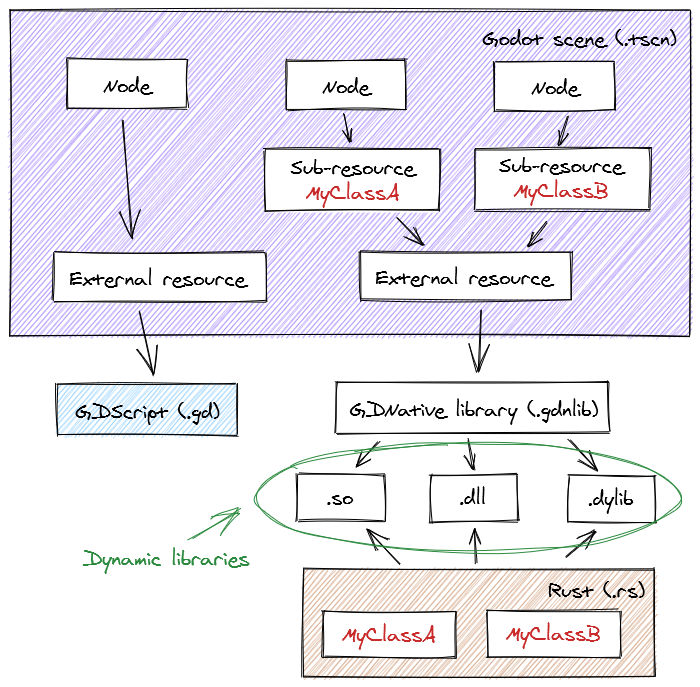Very interested to the godot-rust book project !
I mostly agree with the mentionned Topics that should be covered, I'll just list a few things that comes first to my mind about explaining the whole thing if i had to do it all again :
- Installing Godot Engine.
- Creating a basic Godot project.
- Making sure the reader understands what are Nodes and Scenes, which are fundamental concepts in Godot, the idea is to make everyone start from the same minimal knowledge basis and not rush official Godot docs.
- Installing
rustup. - Understanding the Rust toolchains we may / may not need
# Borrowed from 'mozilla/rust-android-gradle' rustup target add armv7-linux-androideabi # for arm rustup target add i686-linux-android # for x86 rustup target add aarch64-linux-android # for arm64 rustup target add x86_64-linux-android # for x86_64 rustup target add x86_64-unknown-linux-gnu # for linux-x86-64 rustup target add x86_64-apple-darwin # for darwin (macOS) rustup target add x86_64-pc-windows-gnu # for win32-x86-64-gnu rustup target add x86_64-pc-windows-msvc # for win32-x86-64-msvc - (bis) Understanding MSVC vs GNU for Windows users and what they need to install.
- Building a GDNative/Rust library example.
It doesn't need to be something too complicated or too simple but once there, the reader may understand when he wants a Button for example, he can get some API documentation on docs.godotengine.org and translate his knowledge into the doc.rs one, while also knowing he can use some methods and properties in BaseButton, Control, CanvasItem, etc. because Button inherits from X.
- Linking the Godot scene to the GDNative/Rust libraries we built.
At this point, the reader should be able to understand what is going on here.

Assuming yes, we can start talking about exporting (and the purpose of export_presets.cfg) and more specific topics in GDNative/Rust like handling signals, interacting with assets and Instance downcasting.

Over time, the godot-rust library grows, and the intricacies of the project can no longer fit in a simple README file. While there is the API documentation, it is very technical and hard to navigate for new users. The presence of multiple community-written "getting started" tutorials is evidence that the learning curve is problematic and we really need an expanded user guide.
Topics that should be covered
yield,preload, etc.) (#400)Instancedowncasting API (frequently asked question, example issues: godot-rust/godot-rust#328, godot-rust/godot-rust#273, and a lot more) (tracked in #5)Contributing to the book
Since the book is still a very early work-in-progress and mostly blank, please leave a comment here before going ahead to write a section, to avoid duplication of work. PRs for the book should be made against the
bookbranch, instead ofmaster.If there are other topics that you think should be covered in the book, please feel free to suggest them in the comments here.
Supersedes godot-rust/godot-rust#209.